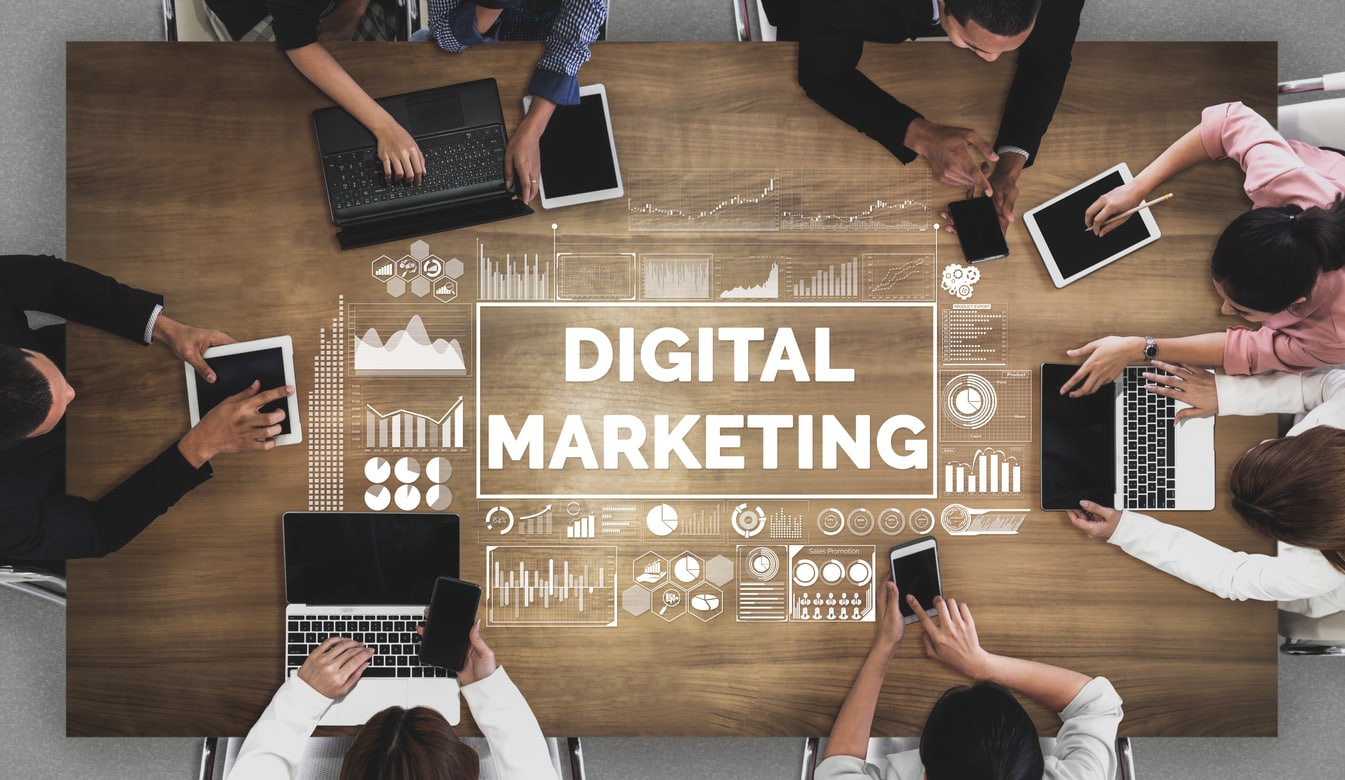Have you ever wondered how brands seem to know exactly what you want, sometimes even before you do?
Or how a well-timed ad or social media post can stop you mid-scroll?
That's the transformative power of digital marketing!
If you're curious about how this field works, or better yet, if it could be your next career move, you're in the right place.
Digital marketing is more than a trend; it's a dynamic and fast-growing career path that combines creativity, analytics, and strategy.
In this guide, we’ll explore whether a career in digital marketing is right for you and give you the practical steps with digital marketing course recommendation to help you pursue this as your career confidently.
Overview of Digital Marketing as a Career
Digital marketing is on a rapid rise, offering vast opportunities for skilled professionals.
Globally, digital marketing is a powerhouse industry, valued at around $366 billion in 2023 and projected to reach an impressive $1.3 trillion by 2033, growing at a steady CAGR of 13.6%.
For those considering a career in this field, the outlook is incredibly promising. As more businesses recognize the importance of an online presence, digital marketing skills are becoming essential for achieving visibility and growth in competitive markets.
This rapidly expanding field offers diverse career paths in areas like SEO, social media, content marketing, and analytics, making it an ideal choice for those seeking both stability and growth.
Why is Digital Marketing a Good Career?
1. High Demand and Industry Growth
Digital marketing is rapidly growing as more businesses move online. With this shift, the demand for skilled digital marketers is higher than ever. Companies need professionals who can help them reach their audience effectively, which means there are plenty of job opportunities in this field.
2. Diverse Career Opportunities
Digital marketing offers a variety of career paths, allowing you to choose what interests you most. Some popular options include:
- SEO (Search Engine Optimization): SEO specialists work to improve a website’s ranking in search engine results. They conduct keyword research, optimize website content, and analyze traffic data to help increase organic search visibility. This role requires a mix of analytical skills and creativity to devise strategies that attract more visitors.
- PPC (Pay-Per-Click) Specialist: PPC specialists manage online advertising campaigns on platforms like Google Ads and social media. They create and optimize ads to maximize clicks and conversions while minimizing costs. This role involves a keen understanding of target audiences and the ability to analyze campaign performance data to make informed adjustments.
- Social Media Marketer: In this role, you'll be responsible for developing and executing SMM marketing strategies on social media platforms such as Facebook, Instagram, and Twitter. You'll create engaging content, manage interactions with followers, and analyze performance metrics to improve engagement. Social media is a key channel for brands to connect with customers, making this role vital for building brand awareness and loyalty.
Must Read: Simple Tips to Increase your Social Media Engagement in 2024
- Content Marketing Specialist: Content marketers focus on creating valuable, relevant content to attract and engage a specific audience. This could include writing blog posts, creating videos, or designing infographics. The goal is to provide information that not only promotes a brand but also educates and informs potential customers, driving traffic and generating leads.
Interested in exploring these in detail? Discover more in our Types of Digital Marketing blog.
3. Lucrative Salary Prospects
Nowadays companies are significantly ramping up their investments in digital marketing to reach and engage with consumers online.
The U.S. Bureau of Labor Statistics reports that digital marketers earn an average salary of $135,030, with entry-level positions starting around $61,250 and experienced professionals earning up to $208,000. These figures highlight the lucrative opportunities available in digital marketing, making it a compelling career choice.
4. Flexibility
Many digital marketing roles offer flexibility in terms of where and when you work. You can often choose to work remotely or have flexible hours, which helps you manage your personal life better. This adaptability can lead to improved job satisfaction and work-life balance, allowing you to perform at your best.
5. Opportunities for Creativity
Digital marketing allows you to express your creativity. Whether it’s designing eye-catching ads, writing engaging blog posts, or brainstorming unique marketing campaigns, you’ll have the chance to showcase your innovative ideas and make an impact.
6. Continuous Learning
Digital marketing is constantly changing, meaning there will always be something new to learn. Staying yourself updated with the latest tools and trends is essential to keep your skills sharp and relevant.
Want to Start Learning For Free?
If you’re excited to build these skills, take a look at free online courses
- Free Digital Marketing Strategy Course
- SEO for Beginners Free Course
- Content Marketing Basics Free Course
- SEO Strategies Free Course
These resources are a great starting point for your journey in digital marketing!
Must Read: The Future of Digital Marketing Jobs: Opportunities and Challenges
How To Pursue a Career in Digital Marketing?
Step 1: Learn the Basics
To lay a strong foundation for your career in digital marketing, it’s crucial to understand the core concepts of the field. Here’s how to get started:
- Understand Digital Marketing: Digital marketing encompasses all online marketing efforts that use the internet or electronic devices. It’s essential to grasp how it differs from traditional marketing and its significance in modern business.
- Key Channels of Digital Marketing: Familiarize yourself with the various digital marketing channels that businesses use to reach their target audiences. These include:
- Search Engine Optimization (SEO): Techniques to improve website visibility in search engine results.
- Pay-Per-Click Advertising (PPC): A model of internet marketing where advertisers pay a fee each time their ad is clicked.
- Social Media Marketing: Promoting products or services through social media platforms like Facebook, Instagram, and Twitter.
- Email Marketing: Sending targeted emails to engage and convert potential customers.
- Content Marketing: Creating valuable content to attract and retain a clearly defined audience.
Explore our free courses to accelerate your learning experience.
- SEO Strategies for Digital Marketing Free Course
- ChatGPT for Content and SEO Free Course
- Google Analytics Free Course
- Google Search Campaign Free Course
- Social Media Marketing Free Course
- Basics of Social Media Automation Free Course
- Email Marketing Free Course
- Basic Tools and Technologies:
Gain familiarity with essential tools used in digital marketing, such as:
- Google Analytics: For analyzing website traffic and user behavior.
- Google Ads: For managing pay-per-click advertising campaigns.
- Social Media Management Tools: Tools like Hootsuite and Buffer for scheduling posts and analyzing engagement.
Get started with our free courses and enhance your learning!
- Digital Marketing Tools Basics Free Course
- Introduction To Google Analytics Free Course
- Introduction to Google Ads Campaign Free Course
Step 2: Enroll in a Comprehensive Course
Once you've grasped the basics, advancing your skills through a structured learning digital marketing course can be incredibly valuable for gaining both in-depth knowledge and hands-on experience.
One of the top digital marketing course we recommend is the Postgraduate Program in Strategic Digital Marketing, offered by Great Learning in partnership with Great Lakes. Here’s what makes this program exceptional:
1. Industry-Focused Curriculum:
The curriculum is designed by industry experts with 225+ hrs Learning content & 9+ Languages & Tools to ensure that you are learning the most relevant and up-to-date practices in digital marketing. Key topics typically include:
- Advanced SEO techniques
- Data-driven marketing strategies
- Effective social media campaigns
- Conversion rate optimization
2. 6 Months of Career Support:
You’ll receive tailored career guidance throughout the program. This includes resume reviews, interview preparation, and job placement assistance to help you transition into the workforce successfully.
3. Flexible Learning Options:
The digital marketing course offers flexible scheduling, allowing you to study at your own pace. This flexibility makes it easier to balance your studies with other personal or professional commitments.
4. Live Personalized Mentorship:
Benefit from one-on-one mentorship sessions with industry professionals. This personalized approach allows you to get specific advice, ask questions, and receive feedback on your work.
5. Dedicated Career Support:
The program includes dedicated support to help you navigate job opportunities in the digital marketing field, ensuring you are well-prepared for your career.
Who Is This Program For?
The Postgraduate Program in Strategic Digital Marketing is designed to cater to various individuals, including:
1. Beginners:
Ideal for those who are new to digital marketing and want to build a strong foundation of knowledge and skills.
2. Current Marketers:
Perfect for professionals already in the marketing field looking to enhance their digital marketing skills and stay competitive in a rapidly changing industry.
3. Entrepreneurs:
Suitable for small business owners who want to effectively market their products or services online and leverage digital marketing for business growth.
4. Freelancers & Consultants:
Tailored for professionals who want to deepen their understanding of digital marketing to provide more value to their clients and improve their service offerings.
How This Program Can Help You:
Enrolling in this program equips you with various skills and experiences that can significantly impact your career:
1. Hands-On Learning:
This digital marketing course helps you to engage in 200+ practical projects in 50+ domains that allow you to apply your knowledge in real-world scenarios. This hands-on experience is invaluable for understanding how digital marketing strategies work in practice.
2. Build Your Portfolio:
Throughout the program, you’ll have the opportunity to create a portfolio that showcases your skills and projects. This portfolio will be essential when applying for jobs, as it demonstrates your capabilities to potential employers.
3. Stay Ahead of Trends:
Digital marketing is constantly changing. By participating in this program, you’ll learn about the latest trends, tools, and technologies that can help you stay ahead of the curve.
4. Network with Peers:
Connect with fellow students and industry professionals, expanding your network in the digital marketing field. Networking can lead to job opportunities, collaborations, and valuable insights into the industry.
Step 3: Get Practical Experience
Hands-on experience is vital for building your skills and confidence in digital marketing. Here are some effective strategies to gain practical experience:
- Create Your Own Blog or Website: Start your blog to apply what you’ve learned about digital marketing. This platform allows you to experiment with different strategies, such as SEO techniques and content creation, while building your online presence.
- Seek Internships: Look for internships with digital marketing agencies or companies. Internships provide a structured learning environment and allow you to work on real projects while receiving guidance from experienced professionals.
- Freelance Projects: Take on freelance projects to diversify your experience. Websites like Upwork or Fiverr offer platforms to find clients looking for digital marketing services. Freelancing helps you build a portfolio while gaining practical knowledge.
Step 4: Focus on a Niche
Specializing in a particular area of digital marketing can enhance your employability. Consider the following niches to focus on:
- SEO (Search Engine Optimization): Dive deep into techniques that improve website rankings in search engines, helping businesses increase their visibility online.
- PPC (Pay-Per-Click Advertising): Specialize in managing paid advertising campaigns across platforms like Google Ads and Facebook Ads, optimizing for better ROI.
- Content Marketing: Learn how to create compelling content that engages audiences and drives traffic to websites. Content marketing involves storytelling and strategic content planning.
By taking specialized courses in your chosen niche, you can develop in-depth skills that make you more appealing to employers.
Step 5: Build a Portfolio
A well-crafted portfolio is essential for showcasing your skills and achievements to potential employers. To create an impressive portfolio, include:
- Real Projects: Highlight the projects you’ve completed, whether through your blog, internships, or freelance work. Provide links and descriptions of your contributions to each project.
- Case Studies: Develop detailed case studies for specific campaigns you’ve managed. Explain the objectives, strategies employed, and results achieved, emphasizing your role in the success of the projects.
- Certifications: Include any relevant certifications you have obtained, such as Google Ads certification, HubSpot Content Marketing certification, or Facebook Blueprint certification. Certifications demonstrate your commitment to professional development and mastery of skills.
Step 6: Stay Updated and Network
To succeed in the ever-evolving digital marketing landscape, it’s crucial to stay informed and connected. Here are some ways to keep up-to-date and expand your network:
- Follow Industry Leaders: Subscribe to blogs, podcasts, and social media channels of respected digital marketing experts. Learning from thought leaders helps you gain insights into best practices and emerging trends.
- Attend Webinars and Conferences: Participate in industry events to learn about new developments in digital marketing and network with professionals. Conferences provide opportunities to meet potential employers and peers in your field.
- Join Online Communities: Engage in forums, social media groups, and online communities focused on digital marketing. These platforms allow you to share knowledge, ask questions, and learn from the experiences of others.
By following these steps, you can effectively pursue a rewarding career in digital marketing, equipped with the skills, knowledge, and network necessary for success in this dynamic and exciting field.
Conclusion
In conclusion, a career in digital marketing is not only promising but also offers a wealth of opportunities for growth and specialization. With the industry continually evolving, possessing the right skills can set you apart in a competitive job market.
If you’re looking to embark on this exciting journey, consider enrolling in the Postgraduate Program in Strategic Digital Marketing offered by Great Learning and Great Lakes. This program is tailored to equip you with essential knowledge and practical experience, ensuring you’re well-prepared for the challenges and opportunities ahead.
As India’s leading professional learning company, with a presence in over 170 countries, Great Learning is dedicated to helping you become a skilled digital marketing professional ready for the future. Don’t miss your chance to invest in your career today!
FAQs
Essential skills include:
- Analytical thinking and data analysis
- Creativity and innovation
- Communication and writing skills
- Technical skills related to digital tools and platforms
- Understanding of marketing principles and consumer behavior
A strong portfolio is essential as it showcases your skills and real-world experience to potential employers. Including case studies, project details, and relevant certifications can significantly enhance your portfolio.
Key tools that you need to be familiar with includes:
- Google Analytics for traffic analysis.
- Google Ads for search advertising campaigns.
- Social media management tools like Hootsuite or Buffer.
- SEO tools like SEMrush or Moz.
- Email marketing platforms like Mailchimp or Constant Contact
Data analysis is vital in digital marketing, helping marketers understand campaign performance, audience behavior, and market trends. Proficiently analyzing data enables informed decision-making and optimization of marketing strategies.




